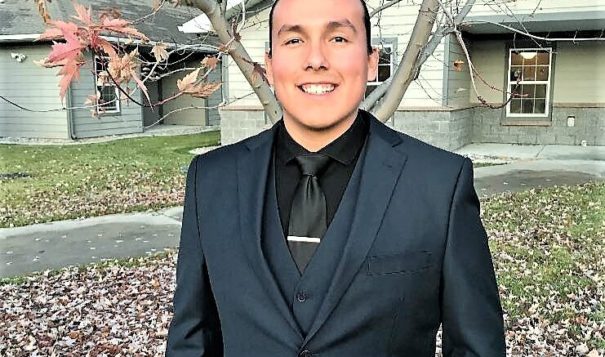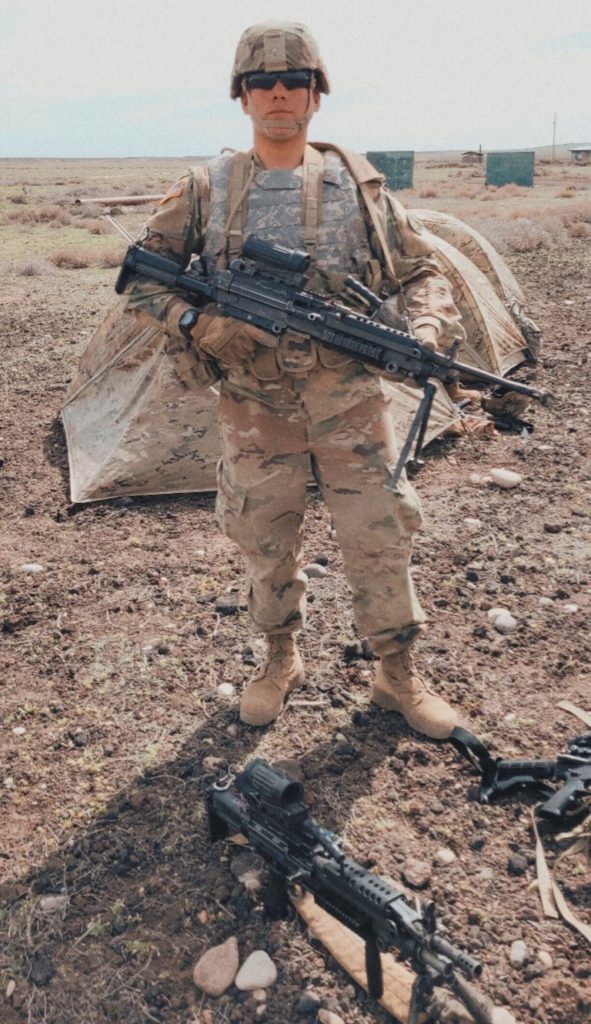News Based on facts, either observed and verified directly by the reporter, or reported and verified from knowledgeable sources.
LaRenzo Roanbear, rising Northern Cheyenne politico
 LaRenzo Roanbear
LaRenzo Roanbear
At age 25, LaRenzo W. Roanbear already has set his sights on a career in electoral politics. A Northern Cheyenne and first-year law student at the University of Montana, Missoula, he plans to run for Congress eventually.
That is why he is pleased about the opportunity to intern with Minnesota senior U.S. Sen. Amy Klobuchar this summer in Washington, D.C. Roanbear said he is very excited for this opportunity. He is looking toward gaining leadership skills and understanding the legislative process of Congress.
Roanbear is pursuing a juris doctorate and a master’s degree of public administration with an emphasis on administrative and federal Indian law. He has been elected to the university’s Student Bar Association, where he currently serves. Meanwhile, he is enlisted in the Montana Army National Guard, where he’s completed the first year of a six-year commitment. He has six months of formal training as an automatic weapons gunner under his belt in the infantry at Fort Benning, Ga. He also is interested in radio technical operator training.
LaRenzo maintains a hectic schedule. During recent weeks, he studied and finished finals, a harrowing experience for law students. He then moved out of his dorm room, dealt with a broken-down car, packed his belongings, and drove to Helena, Mont. From there, he shipped out for additional military training.
He finally had a rare weeklong break before being scheduled to leave for Washington, D.C. on July 1. He then begins a one-month internship in the Senate office. After that he will be deployed overseas for a year of National Guard service.
“In our family, it is important to serve in the military,” he said. “My grandfather, Ben Armentrout, Choctaw — who raised me — was in the Navy during Vietnam, and my other grandfather, Harold Fisher Jr., also served in Vietnam as an 82nd Airborne soldier in the Army.” Clifford Russell Sr., his great grandfather, served in the Army during the Korean Conflict.
A highly respected traditional Cheyenne warrior who fought in the Battle of the Little Bighorn was named Roanbear, from whence came the young man’s name. “My ancestors and family taught me it is important to serve my country and protect our way of life,” he said.

Roanbear has managed to achieve a successful first year of law school. He worked as a resident assistant with UM Housing, supporting, and guiding new first year students at the university. “No doubt, D.C. will be at a faster pace, long nights, and early mornings,” he said.
Already successful at student politics, Roanbear is well-versed about what it means to seek public office. In high school he was elected student body president where he was one of a few Northern Cheyenne in a student body composed mostly of Crow and non-Indians. During his undergraduate years at Salish Kootenai College, he served on the Student Senate for three years. While earning his bachelor’s degree in tribal administration and governance there, he was elected student body president.
At the Student Bar Association, he has a broad array of duties, which include bringing in speakers and awarding funds to student associations within the law school. He has been organizing special events, such as Montana Law Week and Barristers’ Ball. He also serves as a liaison between the law school dean and student body. He said he has represented his student constituents with honesty, respect and selfless service, a part of the seven military values he lives by as a soldier.
Jonathan Windy Boy from the Rocky Boy Reservation, Mont., who has served in the Montana State Legislature for more than two decades, is watching Roanbear. “We need more Indians like him,” Windy Boy said. He and other tribal legislators, such as Jason Small, a Northern Cheyenne, expect to coach and encourage him.
Roanbear knows that pursuing a political career will be a long haul. He thinks it is best to rise through the ranks slowly, gaining experience to be effective. “When I finish law school and get a job, I’ll probably start at the city council level or the state legislature,” he said.
As for tribal politics, at a later point in his life, he would like to serve as a tribal council president where he hopes to “root out corruption.” Considering “bigger forces at work which affect Native Americans,” he said, it’s important to learn, participate and have a voice in the world.
Roanbear gained the Washington internship through a competitive process with the Baucus D.C. Leaders Program, based in Montana. Established by a former ambassador to China, Montana Sen. Max Baucus, the organization helps Montana people gain experience with federal agencies and Congress. The state Department of Policy and Public Administration sponsors it.
Landing an internship opportunity requires submitting an essay of interest reflecting excellent written communication skills. It also calls for submission of transcripts, formal recommendations, and an interview. “They said they selected me because I know how to get things done, but I see it as an incredible learning opportunity,” Roanbear said.
The program offers a stipend of $5,000, which helps defray the cost of transportation to and from Washington, D.C., housing, and personal expenses for the summer experience. “Luckily, I already have a collection of suits, shirts, and ties,” he said.
“My ancestors and family taught me it is important to serve my country and protect our way of life.”
LARENzO ROANBEAR
Like many Northern Cheyenne tribal citizens, Roanbear grew up in one of the most remote and impoverished Native communities in America. In Busby, Mont., a village home to about 650 people, 28 percent unemployment corresponds to poverty, according to the 2022 World Population Review.
Roanbear was raised by a single mother, Haroldine Fisher-Goings; they lived with his grandparents Ben and Estelle Armentrout. His grandfather, Ben, dedicated his career to drug and alcohol recovery, both on a personal and professional basis, influencing him to stay drug- and alcohol-free. “Energy drinks and Gatorade are my drinks of choice,” he said.
His early elementary education was at St. Labre Indian School on the reservation. Later, his family opted to send him off-reservation so he could attend Hardin High School, his mother’s alma mater. That entailed a two-hour daily bus ride, requiring the teenager to rise by 6 a.m. Then, depending upon after-school activities, he sometimes did not arrive home until around 7:30 p.m., when homework absolutely had to be finished.
Yet, during weekends and in the summers, Roanbear found part-time work, mowing lawns, collecting firewood, hauling trash, and often helping tribal elders. “It was good to learn to work and be responsible,” he said. “That gave me strong core values.”
Sen. Ben Nighthorse Campbell, also Northern Cheyenne, has become aware of Roanbear’s rising star. In retirement, Campbell likes to encourage aspiring tribal candidates for public office. “With his determination and given any luck whatsoever, he could be lucky, like me,” the veteran senator told Buffalo’s Fire. “Another trail blazer for Native Americans in politics,” he joked.
“You can see the blossom of our young people growing in LaRenzo and others with similar interests. I am just plumb glad for him to do this and if I can help him in any way, I will,” Nighthorse Campbell said.
Military training and a personal weightlifting routine have helped Roanbear achieve a high level of physical fitness. He also likes to hike. He avidly practices meditation and prayer. He has not really been involved in college sports because, “My arena is politics,” he said. “It’s a big one.”
Clara Caufield can be reached at acheyennevoice@gmail.com.
